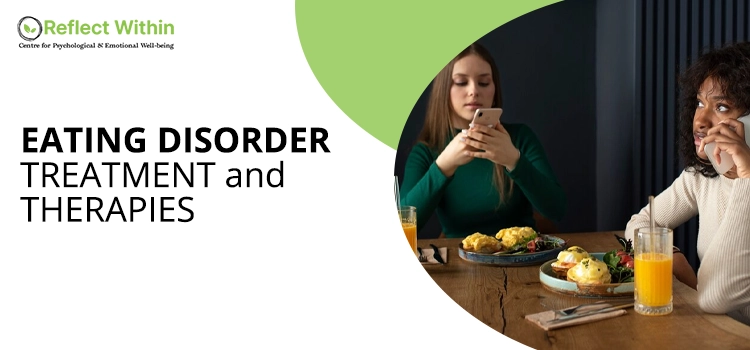Eating Disorder Treatment and Therapies

There are different types of treatment and therapies for eating disorders, such as psychotherapy, medical care and monitoring, nutritional counselling, medications, etc. Sometimes, it can be a combination of these approaches to alleviate the symptoms of the eating disorder. Besides, the co-occurring conditions, such as stress or depression related to this disorder, also need to be treated to promote optimal well-being. Therefore, well-thought-out plans are required to help individuals with eating disorders.
This post elaborates on some common and effective forms of therapies and treatments for eating disorders, so stick to it until the end and explore.
What Are Eating Disorders?
An eating disorder is a problematic eating behaviour or unhelpful thoughts and emotions linked to one’s eating habits. It can severely affect one’s physical, psychological, or social functions. There can be multi-faceted factors that can cause eating disorders, such as negative or unhelpful thoughts, emotions, loss or grief of loved ones, problematic interpersonal relations, deep-rooted fears, and several others.
In most of the cases, it is often developed in adolescence and young adulthood. The common behaviours in this disorder can be restrictive eating or avoidance of certain foods, binge eating, compulsive exercise, purging by vomiting or laxative misuse, and starving oneself to critical health. There are different types of eating disorders, as explained below:
Anorexia Nervosa
A condition wherein people develop an intense fear of weight gain and starve themselves to remain in shape. It results in low weight for height and age, i.e., poor BMI and other harmful effects.
Bulimia Nervosa
It is a form of binge eating disorder wherein an individual eats large amounts of food while avoiding high-calorie food and taking low-calorie or safe food. This behaviour is often secretive and associated with feelings of shame or embarrassment, a kind of unhelpful or problematic thinking.
Binge Eating Disorder
The term binge means excessive indulgence is a specific activity. Binge eating implies a problematic eating condition, wherein a person consumes a large amount of food in a short period, eats more rapidly and doesn’t stop until uncomfortably full. They experience loss of sense while eating and develop a feeling of guilt or distress about the same.
Specified Feeding and Eating Disorder
It is also referred to as the atypical anorexia nervosa, wherein individuals lose weight by self-starving; however, they are not considered to be underweight. Besides, due to the inconsistency in their behaviour or eating habits, the diagnosis of the condition becomes difficult. However, the medical complications are still high.
Avoidant Restrictive Food Intake Disorder (ARFID)
This is a form of extremely picky eating, which results in a consistent failure to meet nutritional needs. Thus, it can cause a significant nutritional deficiency in the individuals.
Pica
This is a severe eating disorder in which people eat things that are not food, nor do they contain any nutritional value, such as soap, chalk, hair, cloth, paper, paint, etc. If the situation prevails for a longer period, it can pose serious threat to the health.
Different Types of Therapies For Eating Disorders
After thoroughly understanding the eating disorder, let’s discuss some of the most effective psychotherapies for improving the condition.
Cognitive Behavioral Therapy
Cognitive Behavioral Therapy is based on the fact that our thoughts influence our emotions and thus action. Sometimes, our unhelpful beliefs about the way we view ourselves can have an effect on eating habits that can cause eating disorders. Therefore, changing the core belief , working on coping strategies to manage emotions and unhealthy eating behaviors can help alleviate the symptoms. Better insight can help them better handle their emotional triggers and move forward. Enhanced cognitive behavioral therapy is a powerful therapy that addresses the patterns of negative thinking or behavior to override them completely.
Dialectical Behavior Therapy
Dialectical behavioral therapy views eating disorders as an emotional reaction to negative circumstances that a person experiences. Dialectal behavior therapy focuses on four areas – mindfulness, distress tolerance, emotion regulation and interpersonal effectiveness to help the individual regulate their thoughts, behaviors and actions related to eating.
Interpersonal Therapy
Interpersonal therapy is a psychotherapeutic treatment which focuses on an individual’s personal relationships and social interactions and how it is leading them to the eating disorder. It is a short-term intervention that aims at untangling the current issues in your relationships. At the same time, it also eases out the symptoms of the eating disorders caused by it.
The core focus areas of the IPT are interpersonal conflicts, unresolved personal problems such as grief and loss or significant life changes. Individuals who have recently suffered the loss or grief are more prone to develop eating disorders. By addressing the issues in one’s interpersonal relations, one can restore one’s normal life and eating habits.
Family Therapy
Family can play a crucial role in nurturing change or development. Therefore, family therapy, which is also a form of the therapy can be introduced to relieve the signs of the eating disorders. It is based on the interaction between the family members to overcome the unhelpful thinking or responses to certain situations.
While coping up with the eating disorders, group dynamics can play a vital role in determining and assessing unhelpful ways within the home. This is mostly recommended or used when the individual dealing with it is young and lives at home. The family members are taught the best ways look after their child’s diet until they recover to a point to the self-resilience.
In A Nutshell
It is important to address the prevailing conditions related to eating disorders in an early stage. The long, persistent issues can pose serious threats to one’s health. Furthermore, they can cause the co-occurrence of other conditions, such as stress or anxiety. Therefore, taking preventive or therapeutic assistance is important. When professional assistance is needed, Reflect Within is a name you can count on.
Latest Post
Categories
Book Session

















